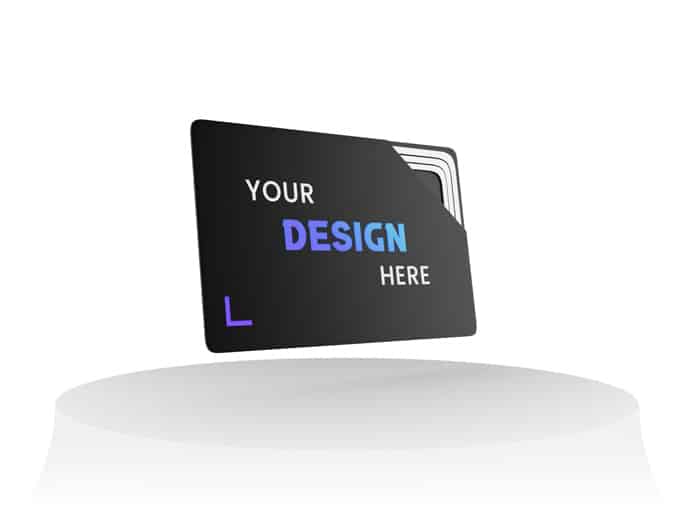
The era of digital business cards: redefining professional interactions and developing networks

The digital business card: redefining professional interactions
Digital business cards are increasingly appreciated and used by professionals, thanks to the ease with which they enable instantaneous exchanges of information. Digital business cards offer fast, efficient connectivity. They can take the form of :
- QR codes (paper or other digital media)
- Cards with NFC chips
- Simple link
With a simple click, business contacts can exchange not only contact details, but also professional profiles, online portfolios and many other relevant resources. This seamless sharing of information is redefining the way people interact in the professional world.
What’s more, digital business cards enable unique personalization: they can be customized with interactive elements, multimedia content or innovative design, and make a unique impact on the impression left on the professional contacts who receive them.
Digital business cards for powerful, relevant digital networking
Digital business cards have become essential tools for developing and maintaining professional networks. They transcend geographical boundaries, enabling individuals to make contacts across national borders. What’s more, the ease with which information can be updated on these digital cards ensures that the database is always up to date, promoting relevant, targeted interactions.
Digital networking with digital business cards is a modern approach to exchanging contact information and establishing professional connections. Unlike paper business cards, digital business cards can be shared via applications or online platforms.
These digital cards can contain a variety of information, such as business contact details, social networking profiles, websites, professional skills, and even links to portfolios or presentations.
Digital networking with digital business cards is thus becoming increasingly easy: digital business cards enable greater ease of sharing, and can be transmitted instantly via specific applications and platforms, eliminating the need for a traditional paper business card.
What’s more, these digital cards don’t become obsolete when information changes: unlike paper business cards, digital business cards can be updated and modified at the click of a button, ensuring constant data reliability, saving money and reducing paper printouts. These cards are also a real environmental asset, helping to preserve the environment.
Digital business cards also facilitate follow-up analysis and interactivity. Online applications and services offer a range of functions for creating and sharing digital business cards.
In short, digital business cards simplify the process of professional networking, offering a modern and convenient way of exchanging business information while reducing the environmental footprint associated with the use of physical paper cards.
The positive impact of digital business cards on the environment and sustainability
As mentioned above, digital business cards have a positive impact on the environment. Indeed, digital business cards contribute to the preservation of natural resources, and this transition to digital is part of an eco-responsible approach, offering a sustainable alternative to the traditional practice of exchanging physical business cards.
Indeed, digital business cards are highly appreciated for their significant contribution to reducing the use of paper. Unlike traditional business cards, which are printed on paper, digital versions are stored electronically and shared via applications or online platforms.
This significantly reduces the amount of trees, water and energy used in the manufacturing process.
By using digital business cards, the need to constantly renew the supply of printed business cards is avoided, greatly reducing the demand for paper and therefore the environmental impact associated with its production. Fewer resources are used to produce, ship and store physical cards.
What’s more, digital business cards can be easily updated without having to produce new cards. This reduces the waste of obsolete cards, and enables information to be kept up to date without having to print new media.
Finally, paper business cards involve physical transport (delivery, postage, etc.) which also consumes resources and produces carbon emissions. Digital business cards are exchanged instantly via online applications, also reducing the need for physical transport.
The use of digital business cards is in this sense environmentally friendly, as it reduces dependence on paper, cuts consumption of natural resources and limits the waste produced by obsolete paper business cards. It’s a more sustainable and responsible way of managing business information, while helping to preserve the environment.
Challenges and opportunities of digital business cards
Despite their many advantages, digital business cards still represent a real challenge. Indeed, dependence on internet connectivity, data security and the need for widespread adoption remain obstacles for many professionals to overcome. Nevertheless, these challenges also offer opportunities for innovation and the development of more secure and accessible solutions.
In short, the era of digital business cards represents a major transformation in the way professionals interact and develop their networks. Their growing adoption reflects the evolution towards an increasingly connected and environmentally conscious society. With significant advantages in terms of practicality, networking and sustainability, these digital cards are likely to continue to shape the future of business interactions.

Written by Camille BODET
The digital business card is a real ally for professionals wishing to promote their business effectively and instantly. In the...Lire la suite
VKARD is an innovative and effective solution to help all professionals stand out from the crowd and reinforce their brand...Lire la suite
If you prepare properly for a job interview, you'll have every chance of winning over the recruiter and getting the...Lire la suite
LinkedIn is a world-renowned business platform, and for good reason! Thanks to its many networking options, LinkedIn is the tool...Lire la suite
Find out how Leexi AI optimizes the management of videoconferences and business calls, saving time and improving efficiency.
In the professional sphere, it's vital to know how to convey certain strong values in order to stand out and...Lire la suite
Mastering the art of conversation is a real asset! By mastering the subtle art of conversation, you'll be able to...Lire la suite
Are you taking part in a trade event and want to do everything you can to make a good impression?...Lire la suite
CRM (Customer Relationship Management) represents a genuine corporate strategy for managing business contacts. This popular tool for professionals is in...Lire la suite
At a time when the professional world is in a perpetual state of competition, we might wonder what place altruism,...Lire la suite















